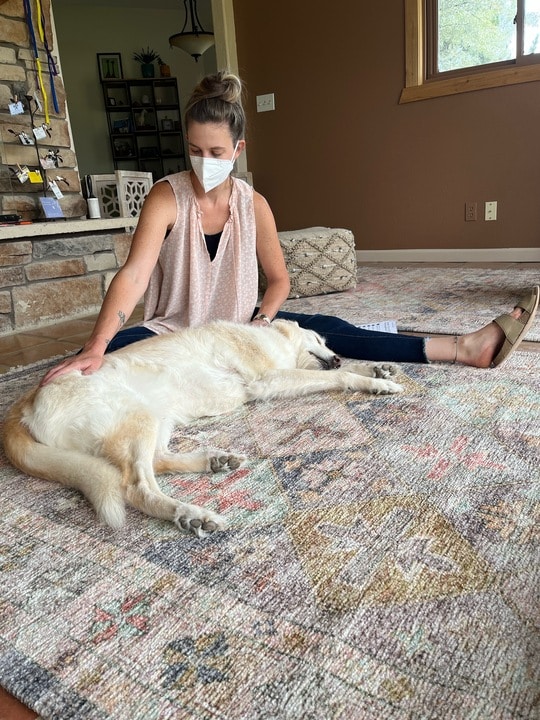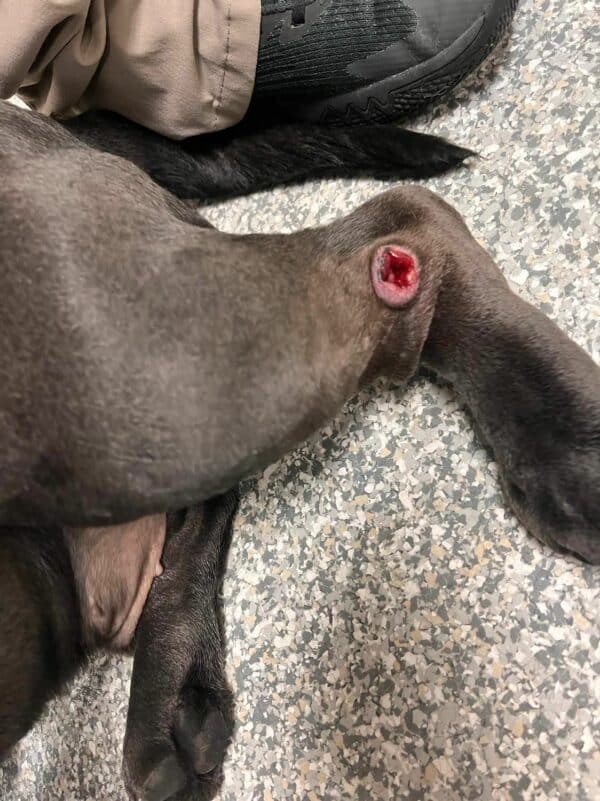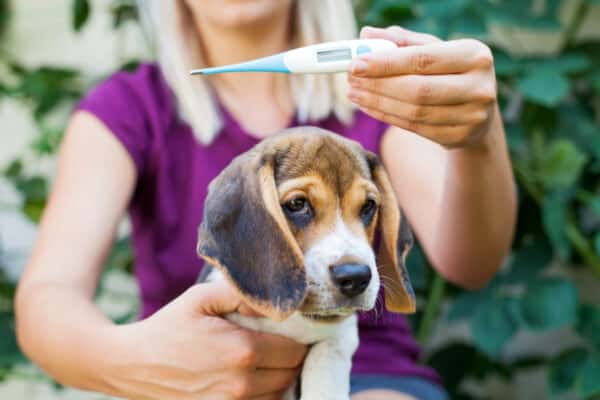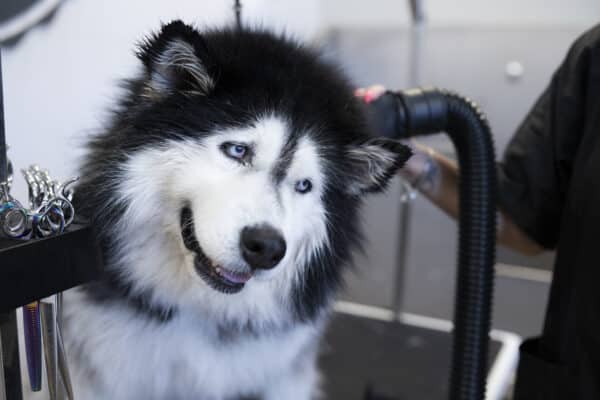If you have ever benefited from massage therapy in your own life, chances are you may be wondering if your dog can receive this bodywork in similar ways. The answer is a resounding YES! The benefits of dog massage are practically endless and with minimal reasons not to.
So how do you know if your dog needs a massage, and more importantly, how do you massage a dog? Rest assured I’ve got you covered — answering all of your burning questions about dog massage and how to incorporate it into your pup’s life.
The history of dog massage
While canine massage has only recently become popular among companion pets, it has actually been around since ancient times. Julius Caesar traveled with a personal massage therapist, who also worked on his war dogs. Egyptian hieroglyphics depict massage therapy being used via animal healers. Massage therapy has been used for agility dogs and horses for many years. These examples are not only super cool, but hopefully validate that considering massage therapy for your dog does not land you in the crazy pet-parent zone. People have been utilizing this powerful approach on animals for many, many years.
Reasons for dog massage
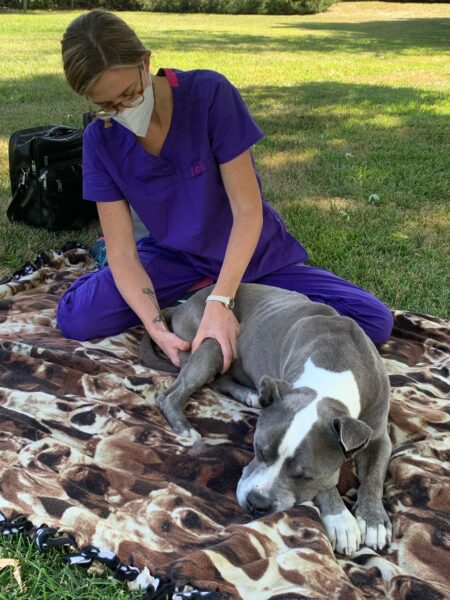
Massage therapy is considered the manual manipulation of muscles and soft tissues of the body. This can be achieved using passive touch and other various strokes that we will cover a bit more below.
Most dogs feel the benefits of a therapeutic massage after as few as three professional sessions. You can incorporate basic massage techniques at home to deliver similar health benefits to your pup as well.
Here are just a few of the incredible benefits of dog massage:
- Promoting circulation
- Nourishing muscles and reducing muscle wasting
- Relieving muscle tension and reducing discomfort
- Stimulating lymphatic circulation, therefore boosting immune function
- Promoting faster healing times
- Deepening the human/animal bond
- Relieving anxiety, fear and stress
- Aiding in the grief process
- Comforting during palliative and hospice care
Canine massage therapy is indicated for many situations. Whether your dog is young and athletic, old and arthritic, or anywhere in between those life stages, massage therapy is an easy and safe modality to boost your pup’s overall quality of life. What I’m saying is: Being alive is practically indication enough.
Here are a few more reasons to massage your dog. It is good for:
- Arthritis
- Soft tissue injuries
- Anxiety, fear and grief
- Joint diseases (such as elbow and hip dysplasia)
- Active dogs (such as working dogs, agility dogs or hiking dogs)
- Dogs with chronic GI disease such as irritable bowel disease (IBD), constipation or sensitive stomachs
- Luxating patellas and other anatomic anomalies
The primary reasons for dogs not to receive massage therapy are:
- Cancer
- Fever
- Antibiotics
Massage therapy increases circulation. Normally, this is a really great thing. However, you may not want to increase circulation when a fever, infection or neoplasia are present. Increased circulation may potentially exacerbate the severity of these.
This list of cancer, fever and antibiotics in no way includes all situations to avoid massage. Kidney disease, pregnancy, some skin ailments and many other conditions also do. Consult with your veterinarian before starting massage therapy.
Some contraindications can be gray areas, depending on where your dog is in their healing journey as well as where you are in the approach to their health. An example here is caring for a senior dog with cancer. Perhaps you are taking a hospice or palliative care approach, and perhaps massage therapy plays a beautiful role at facilitating connection, pain relief and comfort for your pup as they transition through their end-of-life process.
Dog massage therapy at home
When using at-home massage techniques, keep the following in mind to ensure both you and your dog stay safe.
- Consensual touch is really important as you begin to introduce massage therapy to your dog. Consensual bodywork allows for deeper results to be achieved, and keeps you and your pup safe. Watch your dog’s body language and reaction to assess whether your touch is consensual. Signs that your dog may be nervous or stressed include panting, growling, walking away, shaking or yawning. If you notice that your dog is stressed, stop the massage and restart at a later time.
- Signs of pain can be similar to stress and fear. You may notice these signs as you move along a certain portion of your dog’s body. If your dog is in pain during your massage therapy sessions, or if you notice swelling in certain areas of their body, stop your massage session. Consult with your veterinarian and a professional animal massage therapist.
- This is by far the biggest error I see when teaching pet parents how to massage their dog. Your dog does not need deep pressure work, even for sports massage. In fact, the most profound work your dog receives will be when you use no more than 2 pounds of pressure. Press down to the 2-pound mark on your home scale for practice. Less is always more here!
- Avoid direct pressure on the abdomen, spine or joints. Stay 2 inches off of the spine for a large dog and 1 inch off of the spine for a medium/small dog . Never put direct pressure on your dog’s spine, and never press directly down on a bone or joint. Avoid massaging your dog’s abdomen, even if they have gas or stomach pain. One of the most common side effects of these GI conditions is actually lower back pain, so working along the paraspinals (muscles adjacent to the spine) is far more beneficial and can actually promote pooping.
- Consider where you are offering your session. Avoid chaotic times and busy areas in your house.
- Your mood. This is an essential consideration. Do not work on your dog if you are struggling with anxiety or unable to stay present. For maximum benefit and safety, allow yourself to be grounded during these sessions. You and your dog deserve it!
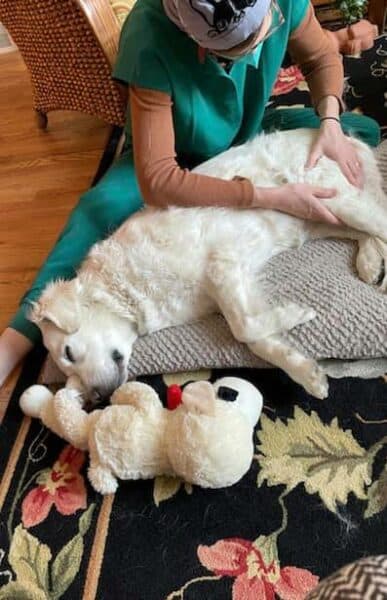
Types of massage therapy strokes for your dog
1. Passive touch
In order to understand passive touch, you must know about active touch. Active touch is when your dog seeks touch. This is when they rub themselves against your body or back themselves into your lap. Passive touch is the opposite and occurs when you impose touch on your dog’s body. There is a spectrum to passive touch. Never underestimate the power of passive touch. I consider touch to be the most healing and vital sense we ever know in this life.
Benefits of passive touch include:
- Connecting
- Grounding
- Setting intention: Are you trying to calm and settle your anxious or senior dog, or invigorate your hiking companion?
- Stimulating the lymphatic circulation
2. Effleurage Strokes
Consider this stroke “petting with intention.” This is your assessment stroke. Effleurage is a gliding, gentle stroke along your dog’s body. Your hands remain in a cupped position with fingers together.
Benefits of effleurage include:
- Assessing for heat, coolness, pain, tension and your dog’s reaction
- Warming up the muscles and tissues
- Increasing blood flow
- Promoting lymphatic circulation
3. Petrissage Strokes
Consider this stroke your “release” stroke. Once you complete effleurage in an area, you perform petrissage. This is a kneading stroke using your entire hand, including the palm or heel portion of your hand and your fingers or your thumb.
Benefits of petrissage include:
- Increasing blood flow
- Promoting lymphatic circulation
- Releasing tension
- Stretching tissues
To learn more about how to massage your dog, please follow my page and stay tuned for upcoming online course announcements.
Massage is powerful, end of story! After implementing this bodywork in their regular wellness routine, I have witnessed senior dogs, dogs with chronic ailments and healthy dogs enter their days with more happiness, ease and zest. You can provide dog massage at-home using basic massage techniques or you can hire a professional for a more therapeutic session. Either way, your pup will thank you.

